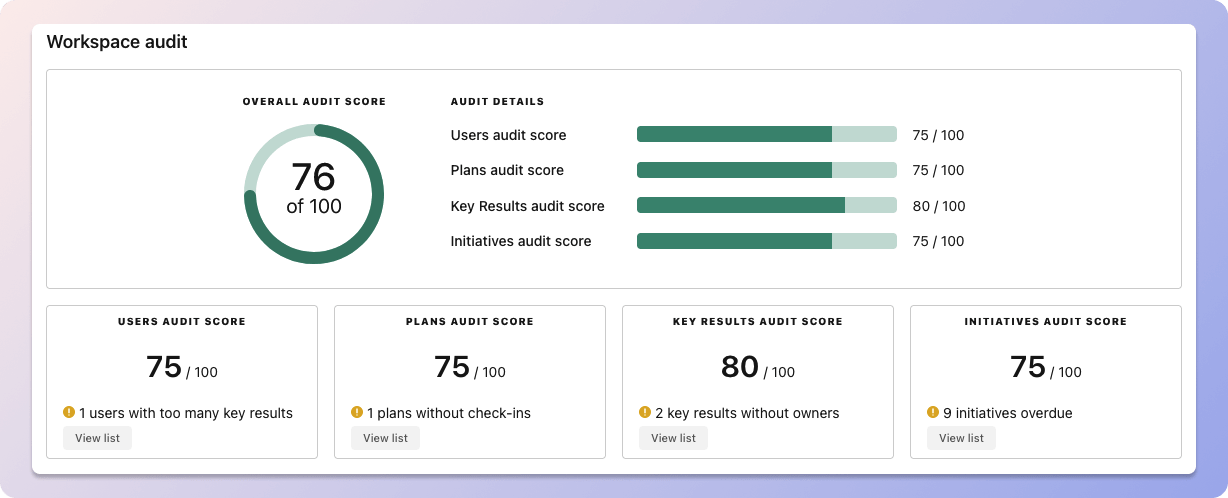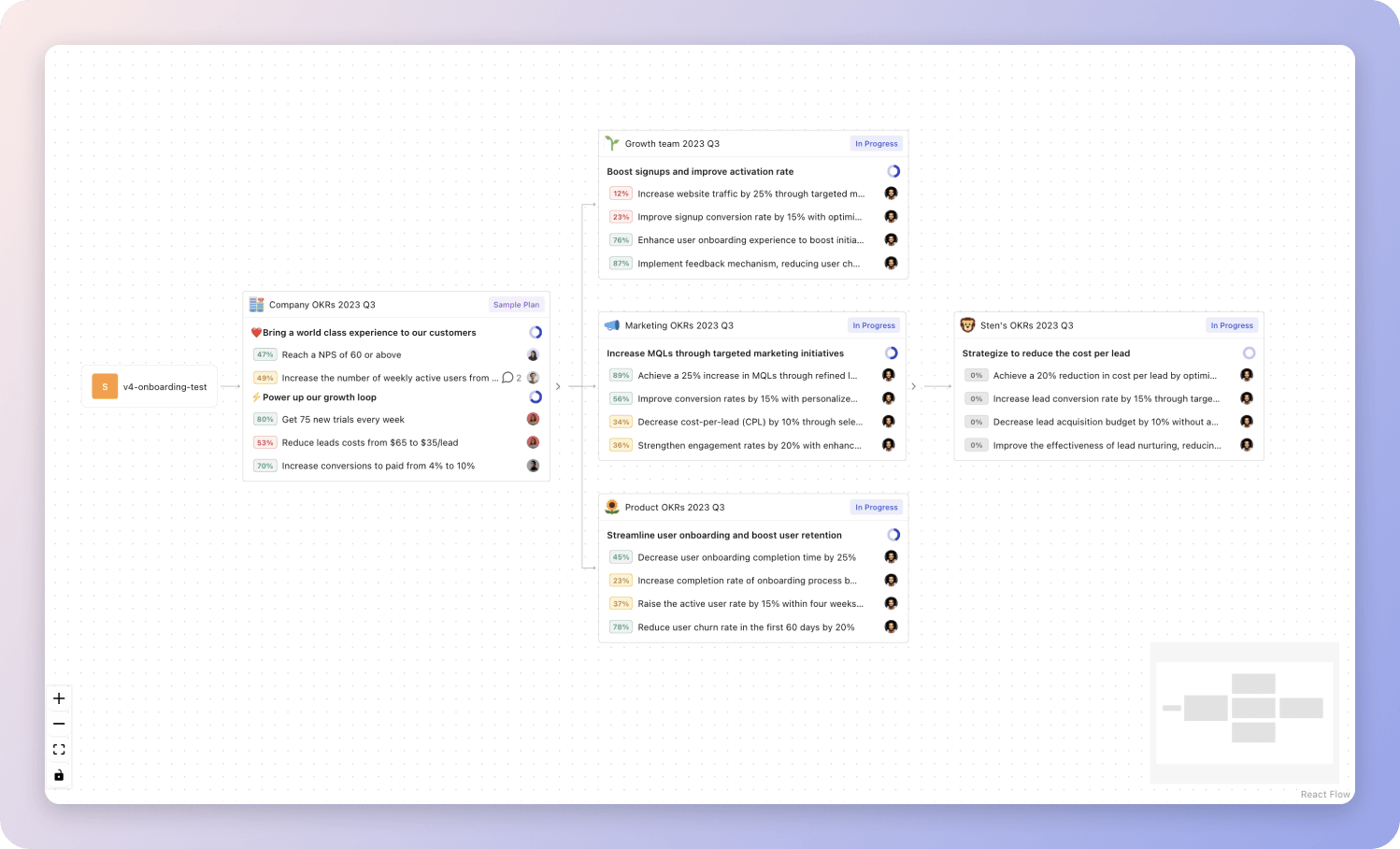4 OKR examples for Soft Skills
What are Soft Skills OKRs?
The Objective and Key Results (OKR) framework is a simple goal-setting methodology that was introduced at Intel by Andy Grove in the 70s. It became popular after John Doerr introduced it to Google in the 90s, and it's now used by teams of all sizes to set and track ambitious goals at scale.
Creating impactful OKRs can be a daunting task, especially for newcomers. Shifting your focus from projects to outcomes is key to successful planning.
We have curated a selection of OKR examples specifically for Soft Skills to assist you. Feel free to explore the templates below for inspiration in setting your own goals.
If you want to learn more about the framework, you can read more about the OKR meaning online.
Best practices for managing your Soft Skills OKRs
Generally speaking, your objectives should be ambitious yet achievable, and your key results should be measurable and time-bound (using the SMART framework can be helpful). It is also recommended to list strategic initiatives under your key results, as it'll help you avoid the common mistake of listing projects in your KRs.
Here are a couple of best practices extracted from our OKR implementation guide 👇
Tip #1: Limit the number of key results
Focus can only be achieve by limiting the number of competing priorities. It is crucial that you take the time to identify where you need to move the needle, and avoid adding business-as-usual activities to your OKRs.
We recommend having 3-4 objectives, and 3-4 key results per objective. A platform like Tability can run audits on your data to help you identify the plans that have too many goals.
 Tability's audit dashboard will highlight opportunities to improve OKRs
Tability's audit dashboard will highlight opportunities to improve OKRsTip #2: Commit to the weekly check-ins
Having good goals is only half the effort. You'll get significant more value from your OKRs if you commit to a weekly check-in process.
Being able to see trends for your key results will also keep yourself honest.
 Tability's check-ins will save you hours and increase transparency
Tability's check-ins will save you hours and increase transparencyTip #3: No more than 2 yellow statuses in a row
Yes, this is another tip for goal-tracking instead of goal-setting (but you'll get plenty of OKR examples below). But, once you have your goals defined, it will be your ability to keep the right sense of urgency that will make the difference.
As a rule of thumb, it's best to avoid having more than 2 yellow/at risk statuses in a row.
Make a call on the 3rd update. You should be either back on track, or off track. This sounds harsh but it's the best way to signal risks early enough to fix things.
Building your own Soft Skills OKRs with AI
While we have some examples below, it's likely that you'll have specific scenarios that aren't covered here. There are 2 options available to you.
- Use our free OKRs generator
- Use Tability, a complete platform to set and track OKRs and initiatives
- including a GPT-4 powered goal generator
Best way to track your Soft Skills OKRs
The rules of OKRs are simple. Quarterly OKRs should be tracked weekly, and yearly OKRs should be tracked monthly. Reviewing progress periodically has several advantages:
- It brings the goals back to the top of the mind
- It will highlight poorly set OKRs
- It will surface execution risks
- It improves transparency and accountability
We recommend using a spreadsheet for your first OKRs cycle. You'll need to get familiar with the scoring and tracking first. Then, you can scale your OKRs process by using a proper OKR-tracking tool for it.
 Tability's Strategy Map makes it easy to see all your org's OKRs
Tability's Strategy Map makes it easy to see all your org's OKRsIf you're not yet set on a tool, you can check out the 5 best OKR tracking templates guide to find the best way to monitor progress during the quarter.
Soft Skills OKRs templates
We've covered most of the things that you need to know about setting good OKRs and tracking them effectively. It's now time to give you a series of templates that you can use for inspiration!
You'll find below a list of Objectives and Key Results templates for Soft Skills. We also included strategic projects for each template to make it easier to understand the difference between key results and projects.
Hope you'll find this helpful!
OKRs to enhance my soft skills competency
Enhance my soft skills competency
Complete a recognized soft skills course with a score of 80% or higher
Research and select a recognized soft skills course
Take the course exam aiming for 80% score
Regularly study the course material
Receive a 20% improvement in feedback scores on leadership and empathy
Schedule one-on-one mentoring sessions regularly
Implement weekly round-table discussions for feedback
Attend leadership and emotional intelligence workshops
Successfully lead one team project displaying improved collaboration and communication
Utilize collaboration tools like Asana or Slack
Assign clear roles to each team member
Implement regular team meetings for open communication
OKRs to enhance soft skills through effective cross-team collaboration
Enhance soft skills through effective cross-team collaboration
Lead one cross-team project resulting in a 20% increase in team efficiency
Evaluate and report the efficiency increase
Identify a project involving multiple teams
Develop and implement efficient cross-team strategies
Attend two cross-department training sessions per month to expand interpersonal skills
Schedule attendance to two sessions
Identify available cross-department training sessions
Participate actively in chosen sessions
Score at least 4.5 in a peer-reviewed soft skills assessment by quarter end
Practice and master active listening and empathy
Request and attentively incorporate peer feedback
Enroll in and complete a soft skills improvement course
OKRs to improve software engineering skills through effective time management
Improve software engineering skills through effective time management
Increase the number of completed coding tasks by 20% each week
Identify and address any obstacles or challenges that may hinder coding task completion
Enhance collaboration and communication among team members for efficient task completion
Provide regular feedback and support to assist in completing coding tasks
Set clear and achievable coding task goals for each team member
Improve adherence to project deadlines by delivering work on time in 90% of cases
Implement effective communication strategies to address obstacles and ensure timely completion
Set clear and realistic deadlines for each project task
Prioritize tasks and create a detailed schedule to ensure timely delivery
Regularly track progress and provide updates to stakeholders to maintain accountability
Reduce time spent on non-essential activities by 15% during work hours
Set specific time limits for non-essential tasks to ensure efficient completion
Prioritize and eliminate non-essential activities based on their impact and importance
Identify non-essential activities taking up significant time during work hours
Regularly assess and adjust the allocation of time to non-essential activities as needed
Attend and actively participate in at least 2 time management workshops or webinars
Research and identify 2 time management workshops or webinars
Apply the learned time management techniques in daily activities for improved efficiency
Take thorough notes during the workshops or webinars for future reference
Register for the selected workshops or webinars to secure a spot
OKRs to elevate programming skills to become a senior programmer
Elevate programming skills to become a senior programmer
Obtain proficiency in at least three advanced programming languages
Participate in coding challenges or hackathons to apply and showcase your proficiency
Practice coding regularly to strengthen your skills in advanced programming languages
Collaborate with experienced programmers or join forums to gain insights and guidance
Enroll in online courses or tutorials to learn advanced programming languages
Lead the successful completion of a complex software development project
Define clear project goals, deliverables, and timeline with the project team
Foster effective communication and collaboration among team members throughout the project
Regularly monitor progress, identify bottlenecks, and take proactive steps to mitigate risks
Identify and allocate appropriate resources to each phase of the software development project
Regularly receive positive feedback and recognition from team members and supervisors
Foster a positive team environment by recognizing and appreciating the achievements of team members
Continue to improve skills and performance to enhance the likelihood of receiving positive feedback
Acknowledge and express gratitude for positive feedback and recognition received from others
Actively seek feedback from team members and supervisors on a regular basis
Mentor and guide junior programmers to enhance their technical abilities
More Soft Skills OKR templates
We have more templates to help you draft your team goals and OKRs.
OKRs to enhance ad performance with 10% higher CTR
OKRs to implement automation in data analysis and visualization
OKRs to enhance the efficiency and reliability of IT services
OKRs to enhance my leadership capabilities
OKRs to enhance data centralization for data-driven management support
OKRs to strengthen quality control for product consistency
OKRs resources
Here are a list of resources to help you adopt the Objectives and Key Results framework.
- To learn: Complete 2024 OKR cheat sheet
- Blog posts: ODT Blog
- Success metrics: KPIs examples